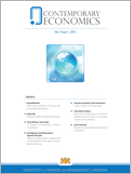Do Credit Supply and Unemployment Risk Matter
for Household Saving? Evidence from Poland
Do Credit Supply and Unemployment Risk Matter
for Household Saving? Evidence from Poland
Author(s): Aneta Maria Kłopocka, Ryszard WilczynskiSubject(s): Socio-Economic Research
Published by: Akademia Ekonomiczno-Humanistyczna w Warszawie
Keywords: Credit; household saving; unemployment risk; uncertainty; Poland;
Summary/Abstract: This paper contributes to the literature on the effects of uncertainty on household saving – a long-standing and extensively explored topic yet leaving a number of issues inconclusive. It concentrates on the labor income uncertainty by addressing saving against unemployment risk in terms of changes in credit supply and households’ financial wealth. Time series analysis uses dataset of quarterly observations from 2003 Q4 to 2019 Q3 for Poland. It provides empirical evidence of the negative relationship of changes in households’ financial wealth and credit availability with the household propensity to save, in line with the buffer saving model. Furthermore, it contributes to the discussion on the choice of uncertainty measures referring to the labor market with a recommendation to employ the subjective (perceived) unemployment expectation index rather than the objective unemployment rate. These results are meaningful for policy implications. They emphasize the role of credit availability for household consumption/saving decisions. In case of expansionary monetary policy and making credit easier to acquire for households, all other things equal, a negative effect on the household saving rate may be expected. This poses a question about the risk of households’ overreliance on credit and therefore about their financial stability in emergency situations.
Journal: Contemporary Economics
- Issue Year: 15/2021
- Issue No: 4
- Page Range: 375-392
- Page Count: 18
- Language: English

